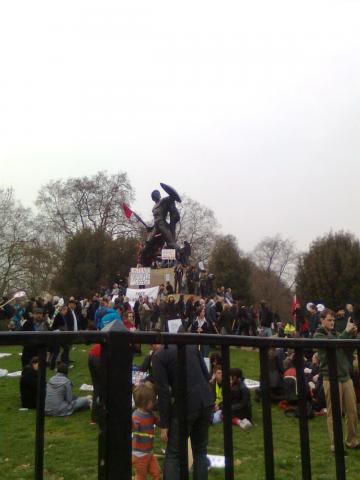Submitted by World Revolution on
Maybe half a million people were on the TUC’s March for the Alternative on 26 March. From demo veterans to those on their first ever protest, all were shepherded from the Embankment to Hyde Park by a combination of police and union stewards.
In The Socialist (30/3/11) you could readthat “All of those capitalist commentators that have written off the trade union movement today as a spent force were decisively answered by this demonstration. The power of the trade unions was undisputedly established.” The ability of the unions to book special trains and charter coaches to get hundreds of thousands of people to walk a couple of miles across London is undeniable. Indeed, the numbers the unions were able to mobilise confirmed that they are still a significant social actor,
Robert Shrimsley, a cynical columnist writing in the Financial Times (1/4/11), observed that
“this kind of peaceful protest is pointless. The system has all the shock absorbers necessary to handle a law-abiding demonstration. The next day ministers were already clear they would ignore the entire event”. His analysis of the “political passivism” was that “Marching is as much about the marchers as it is about the cause. It’s about their need to feel they are doing something; something responsible; something lawful – something futile that makes them all feel better”. And if you add in the subsequent spectacle of a few small fires and graffiti in the West End, and the Fortnums occupations, then you have a neat contrast between the spectacle of a lively minority and the spectacle of enormous numbers marching. And both functioned as outlets for anger at cuts past and future.
Although the TUC had only organised the passive parade to boost their credibility and give a focus for people’s anxiety about their future, the marchers still had to turn up. Coaches and trains might have been free, but you still had to get up on a Saturday, for a stay of some hours in London, including waiting up to 2½ hours for the march to just get off, and listen to an excess of whistles and samba bands. As a protest it was impotent, but it did show how widespread is unease about jobs and declining living conditions.
Capitalism doesn’t work
There were two stated aims to the TUC demonstration: “to give a national voice to all those affected by the cuts” and “to show that people reject the argument that there is no alternative.” The ‘alternative’ offered is one “in which rich individuals and big companies have to pay all their tax, that the banks pay a Robin Hood tax and ... in which we strain every sinew to create jobs and boost ... sustainable economic growth.”
The idea that changes in the taxation system (plus the straining of every sinew) can create jobs and economic growth denies the reality and the depth of the capitalist crisis. There is no way of organising capitalism that will make its deepening crisis stabilise, let alone vanish, and there is no way that capitalism can be made to benefit the exploited rather than the exploiters.
Capitalism means the domination of the bourgeoisie, not only with the richest individuals and businesses having their interests protected, but as a society in which the accumulation of capital is the driving force for the ruling class. Capitalism means workers working for wages, as much as feudalism meant working for a feudal lord and slavery meant working for your owner. They are all forms of exploitation, not means for satisfying human needs (except those of the ruling class).
And, speaking of defenders of exploitation, it came as no surprise to hear Ed Miliband in Hyde Park saying that some cuts were actually needed and not to be opposed. After all, the last Labour government set in motion the cuts that the LibCon coalition is continuing with, and its thirteen years in power left the rich richer and the poor poorer.
Against Miliband’s claims to speak for a “mainstream majority” there were union activists saying it was necessary to go from marches to “a plan of resistance including coordinated strike action”,as Unite union leader Len McCluskey put it. Of course, any ‘plan’ and any ‘coordination’ would, in their vision, be in the hands of the unions. The experience of the working class is that such union actions undermine and ultimately sabotage the effectiveness of workers’ struggles. Unions are still significant social actors, but they serve the interests of the bourgeoisie, not the working class.
Car 2/4/11







 del.icio.us
del.icio.us Digg
Digg Newskicks
Newskicks Ping This!
Ping This! Favorite on Technorati
Favorite on Technorati Blinklist
Blinklist Furl
Furl Mister Wong
Mister Wong Mixx
Mixx Newsvine
Newsvine StumbleUpon
StumbleUpon Viadeo
Viadeo Icerocket
Icerocket Yahoo
Yahoo identi.ca
identi.ca Google+
Google+ Reddit
Reddit SlashDot
SlashDot Twitter
Twitter Box
Box Diigo
Diigo Facebook
Facebook Google
Google LinkedIn
LinkedIn MySpace
MySpace